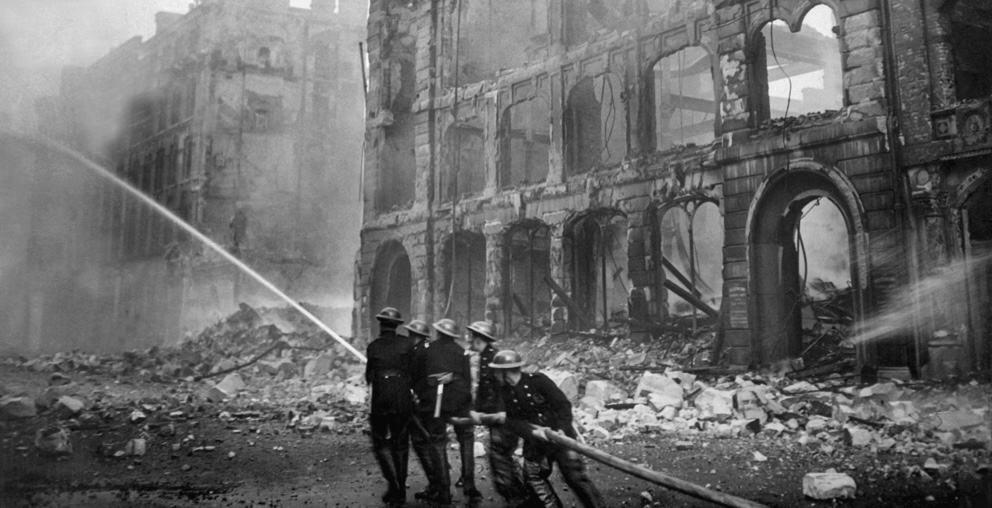There have been pivotal battles that, had they gone another way, would have changed the direction of Western history: John Sobieski’s victory over the Ottoman Empire at the gates of Vienna, the defeat of the Spanish Armada, Washington’s stand at Valley Forge, Wellington’s triumph at Waterloo, but none was as critical for the fate of Western civilization as the events that transpired over the summer and early fall of 1940.
This month marks the 85th anniversary of the unprecedented German victories in the opening days of World War II. In a little over 40 days, Hitler’s German forces overran Holland and Belgium, and defeated the French army, then regarded as Europe’s finest. How shocking was this? In the early months of World War I, France turned back the German army in the First Battle of the Marne—in just 40 days.
During these 40 days in 1940, however, the fate and future not only of France but of Great Britain and Europe hung in the balance. Ever since the German invasion and occupation of Poland the previous September, France and Great Britain had awaited a German attack in the West. The prevailing opinion was that Germany would follow the route taken in World War I, a swing through Belgium, widened to include the Netherlands this time, into France, where the Germans could then deliver a decisive knockout blow.
Indeed, that operation had been prepared as a quick follow-up to the victory over Poland, but harsh weather and Hitler’s doubts about replaying a campaign that had failed before led to a postponement until the spring of 1940. In any event, Allied confidence remained high. The British believed that the German economy could not sustain a long war, and the French were convinced that their strong fortifications in the West, the Maginot Line, would force the Germans to channel their attack where Franch arms were strongest. French and British forces would then march north and meet the Germans along the strong Belgium fortification line instead of waiting for the Germans to cross into French territory.
A harbinger of what was to come took place in early April. The Germans seized control of Norway and Denmark in a lightning campaign that wrong-footed the Allies, especially the British, who believed their naval forces could blunt any attack in the North Atlantic. Among the consequences of the Norwegian campaign: It brought down the lackluster leadership of Prime Minister Neville Chamberlain and ushered Winston Churchill into power.
Churchill, in fact, took office on the very day, May 10, that the Germans attacked in the West. He was 65 and had been isolated in British political circles for years, having made himself unpopular by adopting such causes as the right of Edward VIII to keep the throne despite his unpopular relationship with the American divorcée Wallis Simpson—and his constant warnings about the Nazi threat in the 1930s.
Matters continued to unfold in a manner the Allies never expected. Hitler scrapped a variant of the World War I Schlieffen Plan he had been plannig to use and opted for a strategy devised by one of his most imaginative generals, Erich von Manstein. The Germans allowed the British and French, including their best motorized units, to assume position in Belgium along the Dyle River as German forces struck through the heavily forested Ardennes and then across the Meuse River with armored forces that were not supposed to be able to operate in such terrain. In three days, they had crossed into French territory, scattered weak French military forces (the best French troops were in the north, in Belgium), and opened a 65-mile gap in the French lines. Two days later, Churchill received a call from French Premier Paul Reynaud, hysterically telling him that France was defeated: “We are beaten. We have lost the war.”
Churchill agreed to fly to France to discuss the situation. He discovered that Reynaud was not panicking but reflecting reality: French forces were in retreat and scattered, falling back to the Somme River in northern France. Churchill tried to counter the pessimism he encountered, recalling how grim things were in the opening stages of World War I and how the Allies regained control of the battlefield at the Marne. Speaking in his strange version of their language, he recommended that the French use their reserves to turn back the German threat. The French commander, General Gamelin, responded, “Accune”—there were none. For the first time, five days into his premiership, Churchill realized that England’s fate was at risk and that the French could no longer be counted on.
This was the moment when everything changed for Churchill. He realized that the war would not follow the trajectory of World War I. What he didn’t know was that he was about to take a step into history and become one of the greatest figures of the 20th century.
Churchill hoped the French were overreacting to their losses and that there was still a chance to blunt the German offensive by counterattacks in the north along the Somme. Over the next two weeks, in the face of French retreats, he came to realize he was wrong. Just four days after his meeting with Reynaud, he was informed by the British commander in France, Lord Gort, that British forces might have to fall back to the Channel forts and withdraw from France. The subsequent evacuation from Dunkirk, May 26–June1, saw more than 330,000 troops transported to England. British forces would not set foot in France for another four years.
Dunkirk was welcomed as something of a victory by the British public, but Churchill told Parliament that victories are not won by withdrawals. By the beginning of June 1940, just three weeks into the war, Germany seemed on the brink of total victory.
At the same time that the so-called Miracle of Dunkirk was unfolding, Churchill almost lost control of political matters. On May 26, the war cabinet discussed appealing to Mussolini to intercede and request peace terms from Hitler. Lord Halifax, the influential foreign secretary, favored such a move, arguing that they should at the very least see what terms Hitler would offer. It was a tempting suggestion given the situation in which Britain found itself.
Churchill, however, argued it would be a mistake and eventually turn the nation into little more than a German satellite. He recommended continuing the fight, arguing that all wasn’t lost, mentioning the possibility of American intervention and the fact that the British navy remained strong. He was backed by Neville Chamberlain, who despite his political rejection continued to exercise influence in the cabinet and in conservative political circles in particular. Britain would continue to fight. If the cabinet members had known that, on May 26, as their meetings began, the French for the first time were discussing the possibility of opening armistice talks with the Germans, matters might have been different.
On June 4 Churchill, in one of his more famous speeches that summer, laid before Parliament and the British public the grim situation Britain faced. Here is but an excerpt:
We shall go on to the end. We shall fight in France, we shall fight on the seas and oceans, we shall fight with growing confidence and growing strength in the air, we shall defend our island, whatever the cost may be. We shall fight on the beaches, we shall fight on the landing grounds, we shall fight in the fields and in the streets, we shall fight in the hills; we shall never surrender. And even if, which I do not for a moment believe, this island or a large part of it were subjugated and starving, then our Empire beyond the seas, armed and guarded by the British Fleet, would carry on the struggle, until, in God’s good time, the New World, with all its power and might, steps forth to the rescue and the liberation of the Old.
Here, for the first time, Churchill mentioned the possibility of a German invasion. Even if Europe were to fall under Nazi control, England would fight on, for its own survival and the survival of Christian civilization.
It was brave talk, but Churchill knew that the situation was bleak and that the people should hear the truth and be prepared for the worst.
World War II had reached its first turning point: Britain would fight on. Churchill could have become famous as the man who lost the war by accepting peace terms from Hitler. Hitler, we know, had little enthusiasm for invading England, despite all the plans for what was called Operation Sea Lion. He believed England would eventually see the futility of continuing the struggle, and so he put off an invasion, waiting for the British to approach him for peace terms. Only reluctantly did he order the bombing of Britain in the second week of August as a prelude to an invasion.
The ensuing Battle of Britain was, as the Duke of Wellington said of Waterloo, “a close-run thing.” But the Germans never secured air supremacy, which the German navy deemed absolutely necessary for a successful invasion. On September 17, Hitler postponed any invasion plans until the spring.
With Britain uncowed and undefeated, Hitler set his mind to a major strategic shift. In July he prepared for an attack on the Soviet Union, to be launched in the spring of 1941. Interestingly, Churchill had predicted that, if Britain stood strong, Hitler would turn east.
The second turning point for Churchill was the vindication of his conviction that eventually the United States would recognize the danger of the situation and come to Britain’s aid. In September, the United States announced the transfer of 50 old destroyers to Great Britain, ships Britain didn’t need at the time but that were an important sign. Greater aid would follow over the next six months, including the lavish aid of the Lend Lease system, by which the U.S. supplied its allies with vital war materials, ranging from ammunition, trucks, and aircraft to food, which enabled Britain to continue its fight. As 1940 ended, Churchill could say with the poet Arthur Hugh Clough, “But westward, look, the land is bright.”
Although the country suffered greatly from six months of German bombing—the so-called Blitz—Britain survived, and Churchill was proved right in his determination to fight on during the darkest days of that perilous summer of 1940. Without this resolve, we would not be celebrating that other anniversary this month—VE Day.

